The Single Most Powerful Insight that Will Help You Find the Next Amazon, Google, or Netflix
Companies / Investing 2019 May 30, 2019 - 05:24 PM GMTBy: Stephen_McBride
If you haven’t read me before, let me briefly introduce myself to give you a little context.
I’m Stephen McBride, Chief Analyst at RiskHedge. My job is to find under-the-radar disruptor stocks that are set to dominate the world in the next 10 years… and make investors rich in the process.
Think of buying Amazon a decade ago…
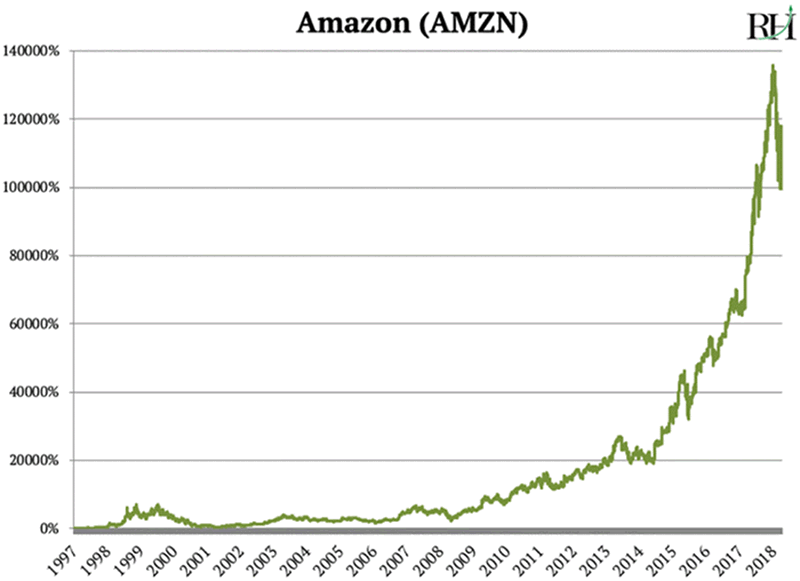
Source: RiskHedge
Or Netflix…
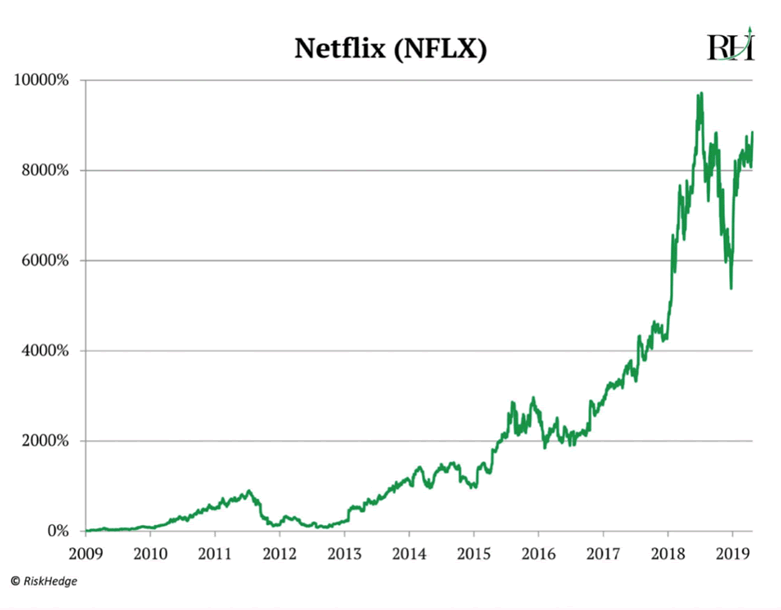
But as I said last week in my essay that got over 3.5 million views, the days of companies like Netflix are numbered.
In this article, I’ll explain why you have to dump these big darling companies… and how to spot stocks that are likely to become the next Amazon.
It All Comes Down to Three Little Lists
Please look the following three lists over carefully. Heck, print them out and keep them at your desk. They’re that important.
Together they hold the key to getting rich through investing in disruption.
This first list shows the 10 largest public companies on earth—ranked by market cap—in early 2001:
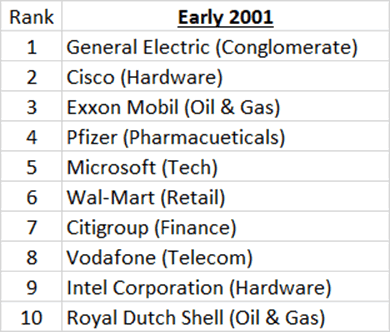
Source: RiskHedge
You probably recognize most of these stocks.
In 2001, they were the best of the best. The biggest of the big. They were household names that had reigned over their industries and handed investors big profits.
Now I’m going to add a second column.
It will show the same rankings a decade later—in early 2011.

Source: RiskHedge
You see what happened?
Seven of the top 10 stocks were displaced, inflicting big losses on many investors who were unfortunate enough to own them.
For example, from 2001–2018, GE stock plunged 79%, Citi collapsed 89%, and Vodafone fell 56%.
Only Exxon Mobil, Royal Dutch Shell, and Microsoft survived. But even these three “survivors” posted terrible returns.
Microsoft fell 15% between 2001 and 2011. Exxon and Shell underperformed the broad market.
Losing 11% of your money over 17 years when the market doubles is a financial disaster.
Now let’s add one more column for late 2018:

Source: RiskHedge
As you can see, this time only 2 of the 10 survived. And once again… the stocks of many of the losers tanked.
Averaged together, the eight losers lost -17% from 2011 to late 2018. The S&P 500 gained roughly 115% in that time.
Now, if you were investing back in 2011, chances are you owned some of the money losers on this list.
Remember, they weren’t obscure penny stocks. They were 8 of the 10 largest stocks on earth!
Even if you didn’t buy them intentionally, you probably owned them. After all, these were the biggest, most popular, most written-about stocks.
Unfortunately, many mutual funds, index funds, ETFs, and retirement plans were stuffed with these losers.
Now, Imagine a Fourth Column Labeled “2024”
How many of today’s top 10 do you think will still be on the list in 2024?
Wouldn’t you agree that at least seven or eight of those stocks will perform poorly going forward?
That is a powerful piece of information. It means most of the biggest and richest companies on earth are typically bad investments.
Glance up at the 2018 list once more. You’ll find it reads like a “Who’s Who” of the most popular US stocks today.
Apple. Microsoft. Google. Facebook. Johnson & Johnson. JP Morgan. Berkshire Hathaway.
These are the stocks everyone pays attention to. They’re the stocks your barber or taxi driver brag about owning. CNBC anchors go on and on about these stocks seven days a week.
Yet, as you now know, the evidence is clear: You’re best off avoiding most of today’s most popular stocks.
Seven or eight of the 10 are likely to tread water, at best, over the next couple of years.
More likely, they’ll lose money.
I’ll repeat: Owning the most popular, most talked about, and largest companies in the world is a money-losing strategy.
How You Can Flip This Great Danger into Your Great Edge
It comes down to the life cycle of disruptive businesses.
You want to sell the tired old giant companies that have already peaked and are sure to fall.
And you want to buy the “rising stars.”
In other words, you want to own the stocks that will make the list in 2024.
Leading up to 2018, the 10 stocks that top the 2018 list were profit-making machines. From 2011–2018, they all posted gains. A perfect 10 for 10.
And several produced big gains. Amazon leapt 870%. Microsoft (MSFT) surged 350%. Google (GOOG) climbed 270%.
But they are not the stocks you want to buy today.
Now you may ask, “OK, Stephen, so how do I find the next Amazon, Google, or Microsoft?”
Three Questions You Should Ask Before Buying Disruptor Stocks
Before I dig into cash flows, valuation, or financial statements, I ask three simple questions:
- Is this company doing something radically different from its competitors?
- Is it breaking the rules? Is it changing the game?
- Is it still small enough relative to the industry size it’s disrupting?
I can tell you 49 in 50 fail this test right out of the gate.
Believe it or not, many CEOs are happy with the status quo. They don’t push hard for their companies to innovate. They’re satisfied to sell the same old stuff in the same old ways, collect a paycheck, and go home at 5 pm.
I’m not interested in these stocks. It’s only a matter of time until they’re disrupted.
My Favorite Disruptor Stocks
I know, this concept may be counterintuitive and still confusing to some of you. So let me give you a couple of examples of disruptor stocks that I recently recommended to my readers.
The first is Alteryx (AYX). It’s a disruptor that’s changing the way companies use data. In short, it’s helping America’s largest companies leverage data to make more money. Alteryx has soared 88% since I wrote about it less than five months ago.
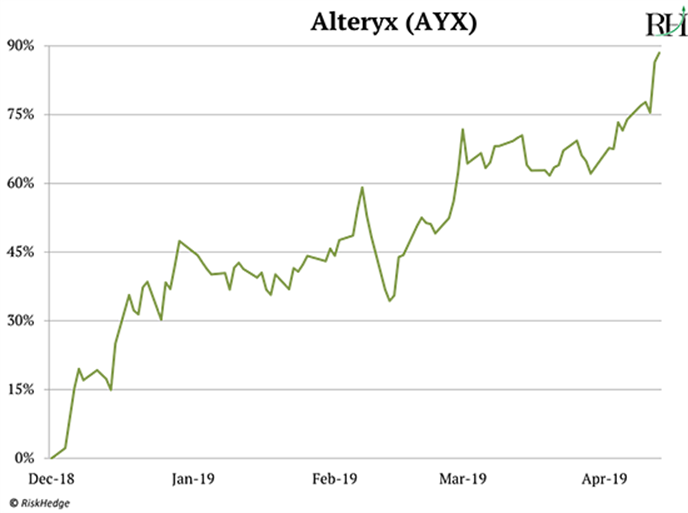
The second stock is The Trade Desk (TTD). It’s one of the first disruptor stocks I recommended publicly. The Trade Desk is changing the way companies buy online ads. Since I wrote about it, it’s soared 135%.
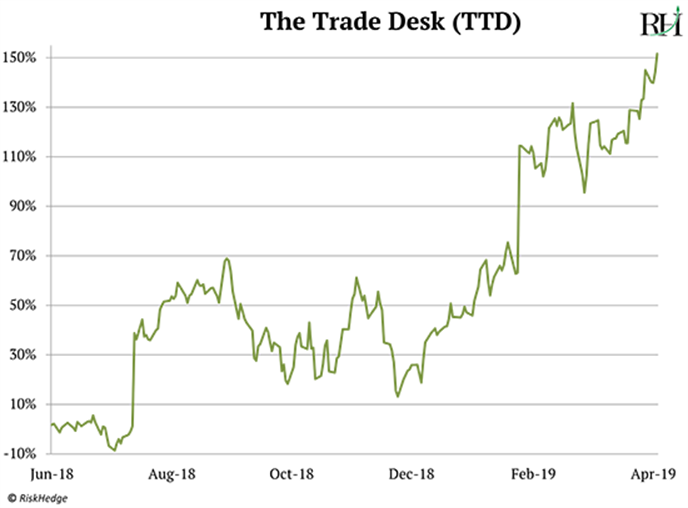
Here’s one more.
Back in December I recommended Xilinx (XLNX), a maker of 5G computer chips. Lots of companies are seizing the opportunity to make parts for 5G. But Xilinx is changing the game with special customizable chips that are ideal for the 5G buildout.
Xilinx has leapt to a 35% gain since I recommended it:
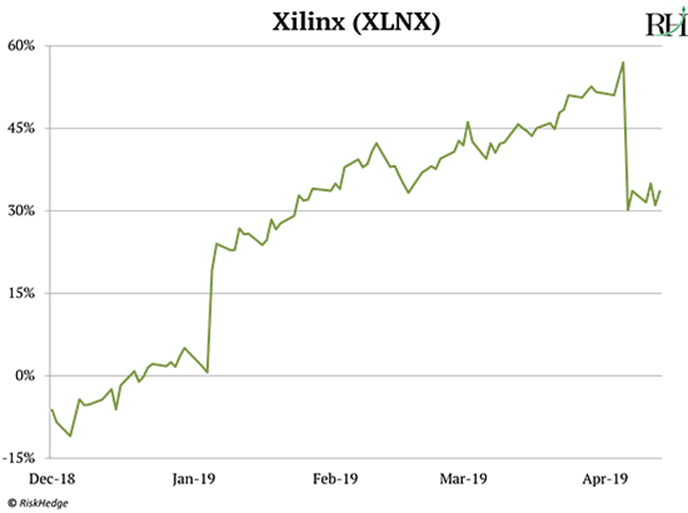
I don’t want to give you the impression these gems are easy to find. In fact, it takes a team of analysts as well as a lot of time and effort to dig them up.
But the profits are worth it.
By Stephen McBride
© 2019 Copyright Stephen McBride - All Rights Reserved Disclaimer: The above is a matter of opinion provided for general information purposes only and is not intended as investment advice. Information and analysis above are derived from sources and utilising methods believed to be reliable, but we cannot accept responsibility for any losses you may incur as a result of this analysis. Individuals should consult with their personal financial advisors.
© 2005-2022 http://www.MarketOracle.co.uk - The Market Oracle is a FREE Daily Financial Markets Analysis & Forecasting online publication.



